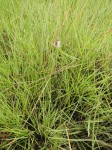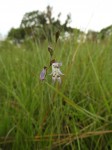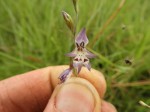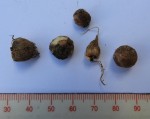Gladiolus gracillimus
Selected images: Click on each image to see a larger version and details of the record View all images (4)
Riverside grassy area in sandy loam soil
Riverside dambo above Kalonde Falls
Oct 2018
Photo: Nick Wightman
Riverside grassy area in sandy loam soil
Riverside dambo above Kalonde Falls
Oct 2018
Photo: Nick Wightman
Riverside grassy area in sandy loam soil
Riverside dambo above Kalonde Falls
Oct 2018
Photo: Nick Wightman
Corms
Natural habitat is usually seasonally wet dambos/grasslands
Cultivated at Dabuyu Farms
Apr 2019
Photo: Nick Wightman
Detailed records: Display species records QDS maps by: Google Maps Point records by Google Maps
Species details: Click on each item to see an explanation of that item (Note: opens a new window)
| Synonyms: |
Gladiolus aphanophyllus Baker |
| Common names: | |
| Frequency: | Locally frequent |
| Status: | Native |
| Description: |
Plants small 15-30(40) cm tall; corms 9-12 mm in diameter, tunics of fine netted fibres with weakly developed neck; foliage leaves 2, lower basal and tightly sheathing to half or three quarters stem length, upper leaf inserted below spike, leaf blades 3-5 cm long and 0.5-1 mm wide, linear with 2 narrow grooves on each surface; flowering stems unbranched; spike 2-4(7) flowered, inclined at an angle of c. 45̊ or more; bracts 7-10 mm long, green or sometimes flushed purple, inner slightly shorter than outer; flowers pale blue to lilac, rarely white, lower 3 tepals each with a dark-blue to purple diamond shaped marking in the upper half or flowers uniformly purple or pale yellow to greenish with deep-yellow markings on lower3 tepals; perianth tube 7-10 mm long, curved outwards; tepals unequal; uppermost (8)10-15 x 8-11 mm, larger than others and arched over stamens, lower 3 tepals 7-12 x 4-5 mm, exceeding the upper tepals when viewed in profile; capsules 7-8 mm long, obovate-ellipsoid. |
| Type location: |
Zambia, Fwambo |
| Notes: | Red Data list status: Widespread; not threatened |
| Derivation of specific name: | gracillimus: from gracilis meaning thin or slender. |
| Habitat: | In seasonally waterlogged marshes and dambos. |
| Altitude range: (metres) | |
| Flowering time: | Nov - Dec |
| Worldwide distribution: | From northern Zambia and Malawi to south west Tanzania. |
| FZ divisions: | N |
| Zambian distribution (Provinces): | N |
| Growth form(s): | |
| Endemic status: | |
| Red data list status: | |
| Insects associated with this species: | |
| Spot characters: | Display spot characters for this species |
| Images last updated: | Thursday 5 September 2019 |
| Literature: |
Goldblatt, P. (1993). Iridaceae Flora Zambesiaca 12(4) Pages 83 - 85. (Includes a picture). Goldblatt, P. (1996). Gladiolus in Tropical Africa Timber Press. Portland, Oregon. Page 164. |
Other sources of information about Gladiolus gracillimus:
Our websites:
Flora of Malawi: Gladiolus gracillimusExternal websites:
African Plants: A Photo Guide (Senckenberg): Gladiolus gracillimusAfrican Plant Database: Gladiolus gracillimus
BHL (Biodiversity Heritage Library): Gladiolus gracillimus
EOL (Encyclopedia of Life): Gladiolus gracillimus
GBIF (Global Biodiversity Information Facility): Gladiolus gracillimus
Google: Web - Images - Scholar
iNaturalist: Gladiolus gracillimus
IPNI (International Plant Names Index): Gladiolus gracillimus
JSTOR Plant Science: Gladiolus gracillimus
Mansfeld World Database of Agricultural and Horticultural Crops: Gladiolus gracillimus
Plants of the World Online: Gladiolus gracillimus
Tropicos: Gladiolus gracillimus
Wikipedia: Gladiolus gracillimus



